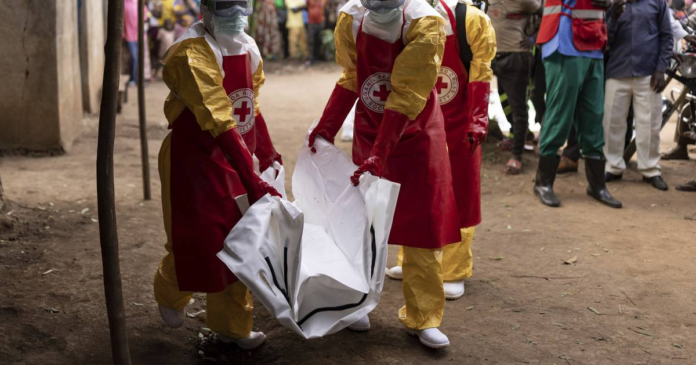While the Ebola outbreak in Uganda does not present the same risk scenario that COVID-19 once did, if we learned anything from the pandemic, now is the time for America to take Ebola seriously.
The Ebola outbreak has stretched to nearly two months. The first case was identified Sept. 20. Since then, the World Health Organization has confirmed more than 135 cases in a nation with more than 45 million people, with 53 deaths, a case fatality rate of nearly 40%. Computer models drawn up by the Ugandan government project that the number of Ebola cases in Uganda could reach 1,200 by April with 500 deaths.
Advertisement
The virus has pushed Uganda to end its school term two weeks early to prevent further spread among schoolchildren.
Ebola is classified as rare and highly contagious. It is rare because cases have tended to be isolated, and spread has been limited. It is considered highly contagious because any contact with an infected person’s body fluids, including saliva or perspiration, can result in a new infection.
Advertisement
Five international airports in the United States, including Chicago’s O’Hare International Airport, are conducting Ebola screening. Around 140 people arrive every day into the U.S. from Uganda.
Three realities make the situation in Uganda disturbing.
First, cases continue to climb. Though the absolute number of Ebola cases remains low, the growth trajectory suggests that the worst may not be behind us. Its spread into Kampala, the capital city, is unsettling, given the highly congested living arrangements. At some point, the number of new cases could surge exponentially, creating public health chaos and panic. The U.S. Centers for Disease Control and Prevention has deployed about 30 people into Uganda to support surveillance and control efforts. The European Center for Disease Control and Prevention is also providing significant support. It is likely that even more assistance will be needed, particularly if the spread of the virus continues.
Health care workers are particularly vulnerable. The WHO reported on Nov. 10 that seven have died. Given their importance in treating and managing the care of sick patients, health care workers must be protected.
Second, there is a high case fatality rate. Currently, there is no licensed vaccine against the Sudan strain that is circulating in Uganda. Prevention of deaths places an enormous burden on health care resources.
The good news is that three experimental vaccines are under consideration in Uganda, which, if successful, could stem the spread of the virus.
Lastly, if anything has been learned from the COVID-19 pandemic, it is that the U.S. is poorly prepared to deal with an outbreak here of a disease such as Ebola. To date, no travelers screened at American airports have been found to be infected. However, if the virus continues to spread in Uganda, the chance that an infected person will enter the U.S. grows.
In 2014, when a case of Ebola entered the U.S., widespread panic ensued and resulted in irrational responses that did more harm than good.
Advertisement
If the U.S. wishes to act responsibly and in its own best interests, the keys are prevention and containment. That means working diligently with Uganda public health officials to suppress and dampen the spread of the virus. Instituting airport point-of-departure screening in Uganda would add an additional layer of protection.
Once the virus enters the U.S. and begins to spread, the ease of transmission will make it difficult to contain. Much like the densely populated city of Kampala, pockets of outbreaks in major metropolitan areas such as New York, Los Angeles and Chicago could emerge that place large groups of people at risk.
With our public health care system ill-equipped to manage such an outbreak, fear will drive many to self-isolate, creating severe local economic repercussions that could resemble what we experienced in spring 2020.
At this point, no known cases of Ebola are in the U.S. The hope is that it will stay that way. Yet hope alone does not offer a formula for success when it comes to an infectious disease like Ebola.
Sheldon Jacobson is a professor of computer science at the University of Illinois at Urbana-Champaign.
Submit a letter, of no more than 400 words, to the editor here or email letters@chicagotribune.com.



